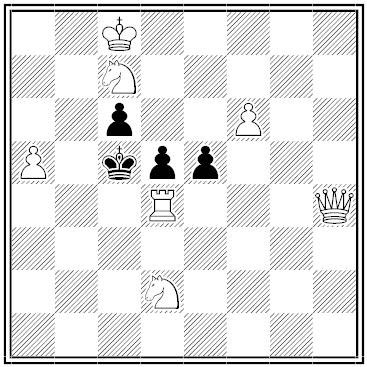Distilled Spirits
When Germany occupied Denmark in 1940, physicist Piet Hein published an innocent-seeming poem:
Losing one glove
is certainly painful,
but nothing compared to the pain
of losing one,
throwing away the other,
and finding the first one again.
The German censors let it go, not understanding its meaning — that while enduring occupation was bad, ceasing to resist would be worse. “It said that what happens to you from outside is less important than how you take it,” he explained later. “The Danes knew what I meant.”
In later years Hein cultivated a talent for such tiny aphoristic poems, which he called “grooks”:
Problems worthy
of attack
prove their worth
by hitting back.
There is
one art,
no more,
no less:
to do
all things
with art-
lessness.
The road to wisdom? — Well, it’s plain
and simple to express:
Err
and err
and err again
but less
and less
and less.
Put up in a place
where it’s easy to see
the cryptic admonishment
T.T.T.
When you feel how depressingly
slowly you climb,
it’s well to remember that
Things Take Time.
In all he wrote more 7,000 grooks, which have become a part of Scandinavian culture. “I cannot really say where my activity as a scientist ends and where my activity as a man of letters begins,” he said. “Whether I am writing a poem or solving some technical problem, I think the same.”
Construction Set
From the ever-inventive Lee Sallows, a self-tiling tile set:
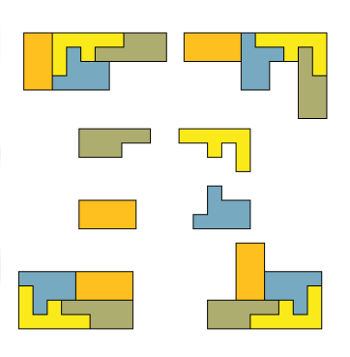
His article on such self-similar tilings appears in the December 2012 issue of Mathematics Magazine.
His and Hers
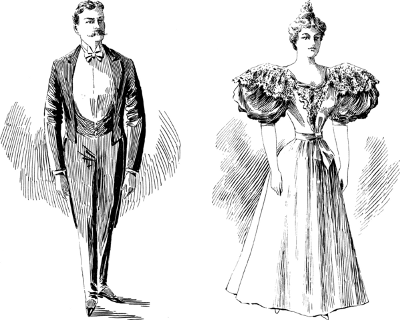
In 1891, while debating “the old, old question whether women’s dress is or is not sensible,” the members of a Brooklyn amateur dramatic company decided to try an experiment. First a woman tried on a man’s clothes:
My! how nice it feels to be able to run up and down stairs in these clothes. You don’t have to think about your clothes at all. Nor about your feet. It’s just splendid! I’d no idea — but my feet feel as if they had clogs on. Don’t you hear them thump? Don’t they look funny? Why, I couldn’t walk far with such weights as these dragging me down. And see my shirt. It won’t stay put. One thing is certain, you feel very free all about your body. … I did not know what to do with my hands or my legs while I was in the parlour. I was not sure of my legs one minute. I didn’t know whether they looked right when I walked; they seem exposed, you know. I wondered how I looked all the time, and when you get to wondering about any part of you, that part of you loses all its pluck. My legs got timid, and in the way. It was not any better when I sat down. Then my hands got big and stupid, and bothered me. The coat tails were in the way, and I couldn’t, for the life of me, think what I had ever seen a man do with his coat tails. The truth is, that I should not wonder if men’s clothes are better than ours, only you’ve got to get used to them. And I should want the coat to have skirts all around it, because you feel so very visible, don’t you know.
Then a man tried on a woman’s:
The queer thing about this whole rig is that you cannot get your mind off the corset. It is so stiff and tight and hot and binding that you forget the rest. I can stand up and lean back against it as if I were leaning against a swing or hammock. When I sit down, if I should lean too far forward I would fall on my face. You cannot keep your balance in the thing. If I try to pick up something from the floor beside me while sitting down, the corset catches me under the arm like a crutch. Sitting or standing, it holds me up like a ramrod — don’t I look so? My arms hang at the sides of it as if they were made afterwards and tacked on, like a doll’s arms. I could not eat a mouthful or take a glass of water with this corset on. Either I or the corset would burst. Just for fun I laid down in the thing, and I had to get Tom to help me up again or I’d have laid there yet. As for the rest of the costume, do you know, I don’t mind it. These things don’t fit, of course; the skirt is too short and the dress won’t button around my stomach; but it seems a fellow could get along with all of it except the corset. It’s queer to feel your legs for the first time. They seem to be let loose inside a sort of box. When I walk I feel the skirt hit against my heels, and when I stand up I feel my legs hot against one another. Their covering is so thin that it amounts to nothing, and so you feel those appendages as you never do in male attire. You don’t know how absurd it is not to be able to see yourself. The bust of this corset and dress stick out under my eyes, and I cannot see anything beneath it except the bottom of this dress. I feel cold half way. I can feel the tops of my stocking plainly by the difference in the temperature where they end.
“I would not dare appear in company in this rig, even if it fitted me; at least not without taking a course of instructions first,” the man said. “You see, I know enough to put my hands in my lap; but they don’t go there. I keep hanging them down by my sides. Then I cannot cross my legs. Every time I try it I get the petticoats and dress all mixed up with my knees. When I sit down I feel as if I was sitting on a pair of long coat-tails all rumpled up. The dress and other things all get into creases and lumps under me. There are some good points about the costume. It is easy round the neck, and your legs are so free that you feel as if you were walking on air; but even in this warm room I would get pneumonia in four hours, for my legs are stone cold and my chest is not much warmer, though my waist is burning hot. Then there is a dragging weight on my hips, while as for the corset — Get out of the room, boys, and let Tom help me off with the blessed thing.”
(From “A Petticoat in Trousers,” Modern Society, Jan. 31, 1891.)
In a Word
macroscian
adj. casting a long shadow
umbratile
adj. pertaining to the shade
obtenebrate
v. to cast a shadow over
lucifugous
adj. shunning light
Label Mates
An exchange of letters in the Times, November 1941:
Sir,
Among the minor reforms that are coming would not the suppression of ‘Esquire’ in general and business correspondence be welcomed? It is a relic of mid-Victorian snobbery, and has little or nothing to commend it. I believe the United Kingdom is the only part of the Empire that uses it.
Yours truly,
Loughlan Pendred
Sir,
How right Mr Loughlan Pendred is in denouncing the use of this word as ‘a relic of mid-Victorian snobbery’ and in demanding its ‘suppression’! But why does he not go further? Is not our all too frequent utterance or inscription of the word ‘Mr’ an equally gross survival from an era which men of good will can hardly mention without embarrassment and shame? I do hope Pendred will go further.
Your obedient servant,
Max Beerbohm
Sir,
Beerbohm’s suggestion that the prefix ‘Mr’ should be abolished does not go far enough. We are still left with our surnames, and this is undemocratic. I demand that we should all be called by the same name, as plain a one as possible. If this should render difficult the filling up of forms, a number could be attached to each — or rather the same — name.
Yours faithfully,
Osbert Sitwell
R&R
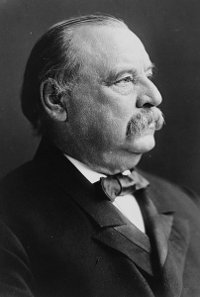
Grover Cleveland underwent a secret surgery for cancer during his second term as president. The United States was in the grip of a financial panic in 1893 when Cleveland noticed a sore on the roof of his mouth. Doctors diagnosed a cancer and urged the president to have it removed, but Cleveland insisted on secrecy — Ulysses Grant’s death by an apparently similar cancer only eight years earlier had unsettled the nation, and Cleveland was loath to publicize his health concerns in the midst of an economic depression.
So on June 30 Cleveland boarded a friend’s yacht under the pretense of a four-day fishing trip to the president’s summer home in Cape Cod. The ship’s saloon had been outfitted as an operating room, and six doctors quietly joined the president before the yacht set sail. Cleveland was anesthetized and surgeon Joseph Bryant removed five teeth and a large portion of his palate and upper jawbone. The team fitted him with a rubber prosthesis to conceal his disfiguration and told the press that only two bad teeth had been removed.
The secret was nearly lost when E.J. Edwards, a reporter for the Philadelphia Press, published an article about the surgery after confirming it with one of the doctors. But Cleveland denied it flatly and launched a smear campaign against him. The president returned to health, served out the remainder of his second term, and died finally in 1908. The disgraced reporter was vindicated only 24 years later, when one of the surviving doctors finally published an article acknowledging the truth.
(Thanks, Colin.)
What?
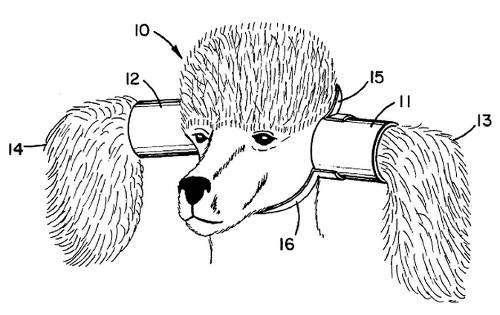
James D. Williams’ “animal ear protectors,” patented in 1980, provide “a device for protecting the ears of animals, especially long-haired dogs, from becoming soiled by the animal’s food while the animal is eating.” The ears are protected by plastic tubes that are held to the animal’s head by adjustable straps.
The invention “may be itself decorated so as to enhance the appearance of the animal in the eyes of its owner and of others.” What that looks like is left to the imagination.
Identity Crisis
This notice appeared in Dublin in July 1781:
This is to certify that I, Daniel O’Flannaghan, am not the Person that was tarred and feathered by the Liberty Mob, on Tuesday last; and I am ready to give 20 Guineas to any one that will lay me 50, that I am the other Man who goes by my Name.
Witness my Hand, this 30th July.
Daniel O’Flannaghan.
Wrote Henry Sampson, “A man who can afford to lay seventy guineas to thirty that he is himself, and nobody else, deserves credit for his boldness, if not for his ingenuity.”
Project Management
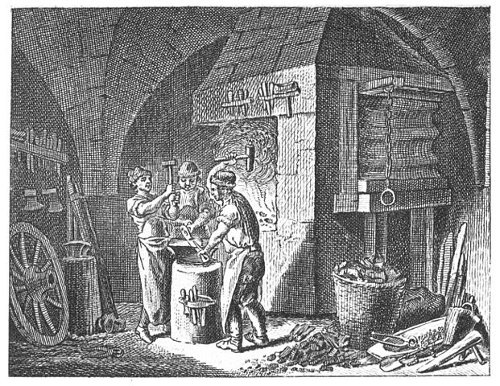
A puzzle by Polish mathematician Paul Vaderlind:
If a blacksmith requires five minutes to put on a horseshoe, can eight blacksmiths shoe 10 horses in less than half an hour? The catch: A horse can stand on three legs, but not on two.

